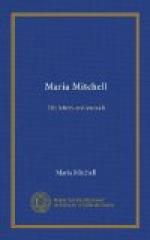“Several persons carried on the exercises from the pulpit, and in the prayers and sermon the audience took an active part, responding in groans, ‘Oh, yes,’ or ‘Amen,’ sometimes performing a kind of chant to accompany the words.... A negro minister said in his prayer, ’O God, we are not for much talking.’ I was delighted at the prospect of a short discourse, but I found his ‘not much talking’ exactly corresponded to ’a good deal’ in my use of words. He talked for a full hour.
“There was something pleasing in the earnestness of the preacher and the sympathetic feeling of the audience, but their peculiar condition was not alluded to, and probably was not felt.
“The discourse was almost ludicrous at times, and at times was pathetic. I saved up a few specimens:
“’O God, you have said that where one or two are gathered together in your name, there will you be; if anything stands between us that you can’t come, put it aside.’
“’God wants a kingdom upon earth with which he can coin-cide, and that kingdom are your heart.’
“‘God is near you when you are at the wash-tub or the ironing-table.’
“’Brethren, I thought last Sabbath I wouldn’t live to this; a man gets such a notion sometimes.’
“April 9, Alabama River. Some lessons we of the North might learn from the South, and one is a greater regard for human life. I asked the captain of our boat if they had any accidents in these waters. He said, ’We don’t kill people at the South, we gave that up some years ago; we leave it to the North, and the North seems to be capable of doing it.’
“The reason for this is, that they are in no hurry. The Southern character is opposed to haste. Safety is of more worth than speed, and there is no hurry.
“Every one at the South introduces its ‘peculiar institution’ into conversation.
“They talk as I expected Southern people of intelligence to talk; they lament the evil, and say, ’It is upon us, what can we do? To give them freedom would be cruel.’
“Southerners fall back upon the Bible at once; there is more of the old-fashioned religion at the South than at the North; that is, they are not intellectual religionists. They are shocked by the irreligion of Massachusetts, and by Theodore Parker. They read the Bible, and can quote it; they are ready with it as an argument at every turn. I am of course not used to the warfare, and so withdraw from the fight.
“One argument which three persons have brought up to me is the superior condition of the blacks now, to what it would have been had their parents remained in Africa, and they been children of the soil. I make no answer to this, for if this is an argument, it would be our duty to enslave the heathen, instead of attempting to enlighten them.
“We hear some anecdotes which are amusing. A Judge Smith, of South Carolina, moved to Alabama, and became a prominent man there. He was sent to the Senate. He was violently opposed by a young man who said that but for his gray hair he would challenge him. Judge Smith said, ’You are not the first coward who has taken shelter beneath my gray hairs.’




